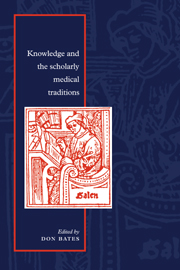Book contents
- Frontmatter
- Contents
- List of illustrations
- List of contributors
- Acknowledgements
- 1 Scholarly ways of knowing: an introduction
- Part 1 Scholarly medicine in the West
- 2 Epistemological arguments in early Greek medicine in comparativist perspective
- 3 Autopsia, historia and what women know: the authority of women in Hippocratic gynaecology
- 4 The growth of medical empiricism
- 5 Scholarship and social context: a medical case from the eleventh-century Near East
- 6 The experience of the book: manuscripts, texts, and the role of epistemology in early medieval medicine
- 7 Artifex factivus sanitatis: health and medical care in medieval Latin Galenism
- 8 Epistemology and learned medicine in early modern England
- Part 2 Chinese traditional medicine
- Part 3 Āyurvedic medicine
- Part 4 Commentaries
- Index
5 - Scholarship and social context: a medical case from the eleventh-century Near East
Published online by Cambridge University Press: 01 February 2010
- Frontmatter
- Contents
- List of illustrations
- List of contributors
- Acknowledgements
- 1 Scholarly ways of knowing: an introduction
- Part 1 Scholarly medicine in the West
- 2 Epistemological arguments in early Greek medicine in comparativist perspective
- 3 Autopsia, historia and what women know: the authority of women in Hippocratic gynaecology
- 4 The growth of medical empiricism
- 5 Scholarship and social context: a medical case from the eleventh-century Near East
- 6 The experience of the book: manuscripts, texts, and the role of epistemology in early medieval medicine
- 7 Artifex factivus sanitatis: health and medical care in medieval Latin Galenism
- 8 Epistemology and learned medicine in early modern England
- Part 2 Chinese traditional medicine
- Part 3 Āyurvedic medicine
- Part 4 Commentaries
- Index
Summary
In Jumādā II 441/November 1049, the Nestorian Christian physician al-Mukhtār ibn Buṭlān (d. after 455/1063) arrived in Cairo from Baghdad. Shortly thereafter, he sent an essay on a scientific topic to cAlī ibn Riḍwān (d. 460/1067–8), chief physician to the Fāṭimid caliph al-Mustansir (r. 427–87/1036–94), and invited him to comment. Ibn Riḍwān's response was two withering public critiques full of ad hominem invective (only one of these now survives), and quite predictably they provoked an equally abusive reply from Ibn Buṭlān. Ibn Riḍwān then countered with five further missives: a follow-up critique in reference to the issues already raised in the debate, a more general open letter to ‘the physicians of old and new Cairo’ in which he poured scorn and abuse on his adversary with even greater violence, and three other now-lost essays bearing titles suggesting the continuation of similar diatribes against his adversary. Ibn Buṭlān eventually left Cairo defeated and humiliated, but some time after his departure from Egypt he returned to the fray with a last shot of his own entitled Waqcat al-aṭibbā' (‘Battle of the Physicians’). This work too is lost.
This controversy was long remembered in medical and scientific circles, and the ten essays comprising its literary side were evidently in widespread circulation in later times. In 1937, the German orientalists Joseph Schacht and Max Meyerhof published the five extant works as ‘a contribution to the history of Greek learning among the Arabs’. The essays have been widely read ever since; and indeed, among historians of Islamic science and medicine the Ibn Riḍwān/Ibn Buṭlān polemic has become one of the best-known episodes in the field.
- Type
- Chapter
- Information
- Knowledge and the Scholarly Medical Traditions , pp. 84 - 100Publisher: Cambridge University PressPrint publication year: 1995
- 2
- Cited by

